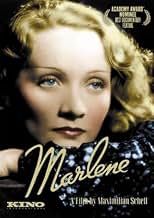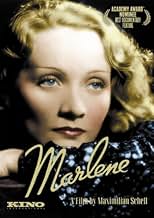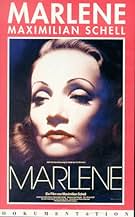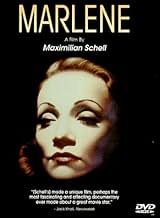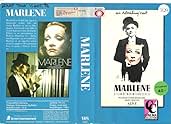Retrospective on the career of enigmatic screen diva Marlene Dietrich.Retrospective on the career of enigmatic screen diva Marlene Dietrich.Retrospective on the career of enigmatic screen diva Marlene Dietrich.
- Director
- Writers
- Stars
- Nominated for 1 Oscar
- 5 wins & 2 nominations total
- Director
- Writers
- All cast & crew
- Production, box office & more at IMDbPro
Featured reviews
Maximilian Schell's documentary portrait of legendary screen siren Marlene Dietrich separates the woman from her myth, but because Dietrich herself refused to appear on camera the director was presented with a dilemma: how to construct the film without its subject? His clever (if desperate) solution was to document, instead, his own frustration in making the film, using Dietrich's disembodied, tape recorded voice to supplement scenes of the director scrambling for cohesive footage.
Surprisingly, the finished film (messy as it often is) creates a remarkably full picture of the reclusive star, despite (and in large part because of) her absence. Dietrich's voice alone – obstinate, caustic, skeptical of Schell's project, scornful of her own allure – says more (with more insight) than any scripted monologue could provide, and her unedited conversations with Schell (an old comrade) are unpredictable and candid, often becoming verbal sparring matches in two languages.
Surprisingly, the finished film (messy as it often is) creates a remarkably full picture of the reclusive star, despite (and in large part because of) her absence. Dietrich's voice alone – obstinate, caustic, skeptical of Schell's project, scornful of her own allure – says more (with more insight) than any scripted monologue could provide, and her unedited conversations with Schell (an old comrade) are unpredictable and candid, often becoming verbal sparring matches in two languages.
"You won't believe it but the lady is extremely funny" (Maximilian Schell on Marlene Dietrich)
September 1982, the Paris apartment of Marlene Dietrich...contracted for "40 hours of talking," the 81 year-old movie star at last agreed to take part in the documentary about her phenomenon. Mixed feelings, various expectations, surprises or disappointments: contradictory emotions turn up in viewers of this! Ms Dietrich reluctantly talks to Maximilian Schell, the most successful actor of German background in Hollywood. The two know each other thanks to their collaboration in the historic JUDGEMENT OF NUREMBERG 21 years earlier under the direction of Billy Wilder. Both became the expiating conscience for the post war period in motion picture industry. And both Marlene and Maximilian know that. Yet, after all these years, what pays off is getting to know the legendary movie star and encourage her to talk about MARLENE naturally. At this point she is too modest, aging, reclusive, very much to the point in her answers and too practical to praise her own heyday. Just talk. However, it appears that this little may appear too much for a great movie star. If people expect Ms Dietrich to reveal much of herself, they had better put aside this illusion. Nevertheless, among many of the documentaries, MARLENE stands on its own being a must see for her fans. Why?
Because of its wonderfully specific style! As a matter of fact, all the aspects that have been criticized about the movie are its main pluses. Critical viewers are usually too much closed within the world of 'clear, linear presentation.' When something sophisticated comes, they tend to misinterpret. Soon we realize that it is not a conventional documentary about a celebrity but an absorbing chain of interaction, sometimes contradictory, impolite, absurd, quarrelsome interaction seemingly unendurable for an ordinary 'watcher.' It is all like a puzzle of hardly any information and viewers may easily be confused where the talks lead us. But isn't every human being a sort of puzzle which may only be harmed by 'conventions?'
Considering Marlene's undeniably strong personality, along with the director Maximilian Schell, we try to figure out the personality, the phenomenon of the silver screen star who obstinately does not let anyone into her private life which has always been, as she puts it, 'completely separated from her professional life.'
This time, she deliberately fails to do what the director says. The fact we do not see their faces but only hear their voices supplies us with inevitable imagination and empathy. To a greater extent, we are with Mr. Schell whose pursuits and patience influence us and make us look forward to the climactic encounter with the star's personality. Despite its chaotic moments and highly unconventional style of a documentary, the whole puzzle becomes meaningful only with the patience of the director and the patience of the viewers. Therefore, MARLENE meets such radical and extreme impressions. Here Ms Dietrich is hardly clear to understand, a hardly likable creature who smiles at everyone, accepts every view and nods like a politically correct 'parrot' She is not 'exciting' forget it! (that is not what she was contracted to be). She is honest about the hard work that the 'snotty kid' inevitably needed for the success; she is no dreamer with sentimental, 'kitschy' feelings; she is not fond of past; she is no 'amateur improviser' but a very practical woman who seems to have known the business as hardly anyone has. Most importantly, she is herself at the grave of her career and the twilight of her life...still before... revealing to us the timelessly high standards in art and style.
That is why, Schell's MARLENE being least conventional makes it a documentary she truly deserved (paradoxically so reluctant from her side). But let me highlight one more thing that appears of highest importance when you see this documentary. That is Ms Dietrich's striking modesty and practical attitude when she reacts to Schell's 'comments' on her films and certain scenes.
Alfred Hitchcock, having worked with Marlene Dietrich on his STAGE FRIGHT, said a very simple, yet an extremely meaning sentence about her: "She is a professional." Here lies the key to understanding her persona. Although she is sometimes so pretentious while talking to Mr. Schell, her ideas are deeply rooted in her very professional attitude. She is not happy about being shown the things she had done. Consider her notes on certain people she had collaborated with, in particular Orson Welles, Burt Bacharach, Fritz Lang and, foremost, Josef Von Sternberg. Moreover, her 'interpretation' of the scenes she had played, including the ones in MOROCCO, DISHONEST and THE SCARLETT EMPRESS are purely constructive and objective with the healthy distance and criticism. With this true professionalism comes her modesty: "I was an actress. I made films. Period." Elsewhere, she denies her sex appeal and erotic magnetism evoked in certain films. Enigmatic?...Complexed?....Reclusive?....Sad? ....
"...I meant no harm!" We meant no harm! Our curiosity has led us all to a dangerous spot, to the encounter with melancholy and emotions. Nevertheless, Ferdiand Freiligrath's poem allows us all for a genuine tear, something all human beings, no matter if great cinema stars or simple viewers, deserve. A moment of Human Phenomenon for humans who should 'love as long as love they can.'
No 'blind idolatry' but a very realistic glimpse of Marlene who had her significant moment in the cinema history and won world acclaim. 8/10
September 1982, the Paris apartment of Marlene Dietrich...contracted for "40 hours of talking," the 81 year-old movie star at last agreed to take part in the documentary about her phenomenon. Mixed feelings, various expectations, surprises or disappointments: contradictory emotions turn up in viewers of this! Ms Dietrich reluctantly talks to Maximilian Schell, the most successful actor of German background in Hollywood. The two know each other thanks to their collaboration in the historic JUDGEMENT OF NUREMBERG 21 years earlier under the direction of Billy Wilder. Both became the expiating conscience for the post war period in motion picture industry. And both Marlene and Maximilian know that. Yet, after all these years, what pays off is getting to know the legendary movie star and encourage her to talk about MARLENE naturally. At this point she is too modest, aging, reclusive, very much to the point in her answers and too practical to praise her own heyday. Just talk. However, it appears that this little may appear too much for a great movie star. If people expect Ms Dietrich to reveal much of herself, they had better put aside this illusion. Nevertheless, among many of the documentaries, MARLENE stands on its own being a must see for her fans. Why?
Because of its wonderfully specific style! As a matter of fact, all the aspects that have been criticized about the movie are its main pluses. Critical viewers are usually too much closed within the world of 'clear, linear presentation.' When something sophisticated comes, they tend to misinterpret. Soon we realize that it is not a conventional documentary about a celebrity but an absorbing chain of interaction, sometimes contradictory, impolite, absurd, quarrelsome interaction seemingly unendurable for an ordinary 'watcher.' It is all like a puzzle of hardly any information and viewers may easily be confused where the talks lead us. But isn't every human being a sort of puzzle which may only be harmed by 'conventions?'
Considering Marlene's undeniably strong personality, along with the director Maximilian Schell, we try to figure out the personality, the phenomenon of the silver screen star who obstinately does not let anyone into her private life which has always been, as she puts it, 'completely separated from her professional life.'
This time, she deliberately fails to do what the director says. The fact we do not see their faces but only hear their voices supplies us with inevitable imagination and empathy. To a greater extent, we are with Mr. Schell whose pursuits and patience influence us and make us look forward to the climactic encounter with the star's personality. Despite its chaotic moments and highly unconventional style of a documentary, the whole puzzle becomes meaningful only with the patience of the director and the patience of the viewers. Therefore, MARLENE meets such radical and extreme impressions. Here Ms Dietrich is hardly clear to understand, a hardly likable creature who smiles at everyone, accepts every view and nods like a politically correct 'parrot' She is not 'exciting' forget it! (that is not what she was contracted to be). She is honest about the hard work that the 'snotty kid' inevitably needed for the success; she is no dreamer with sentimental, 'kitschy' feelings; she is not fond of past; she is no 'amateur improviser' but a very practical woman who seems to have known the business as hardly anyone has. Most importantly, she is herself at the grave of her career and the twilight of her life...still before... revealing to us the timelessly high standards in art and style.
That is why, Schell's MARLENE being least conventional makes it a documentary she truly deserved (paradoxically so reluctant from her side). But let me highlight one more thing that appears of highest importance when you see this documentary. That is Ms Dietrich's striking modesty and practical attitude when she reacts to Schell's 'comments' on her films and certain scenes.
Alfred Hitchcock, having worked with Marlene Dietrich on his STAGE FRIGHT, said a very simple, yet an extremely meaning sentence about her: "She is a professional." Here lies the key to understanding her persona. Although she is sometimes so pretentious while talking to Mr. Schell, her ideas are deeply rooted in her very professional attitude. She is not happy about being shown the things she had done. Consider her notes on certain people she had collaborated with, in particular Orson Welles, Burt Bacharach, Fritz Lang and, foremost, Josef Von Sternberg. Moreover, her 'interpretation' of the scenes she had played, including the ones in MOROCCO, DISHONEST and THE SCARLETT EMPRESS are purely constructive and objective with the healthy distance and criticism. With this true professionalism comes her modesty: "I was an actress. I made films. Period." Elsewhere, she denies her sex appeal and erotic magnetism evoked in certain films. Enigmatic?...Complexed?....Reclusive?....Sad? ....
"...I meant no harm!" We meant no harm! Our curiosity has led us all to a dangerous spot, to the encounter with melancholy and emotions. Nevertheless, Ferdiand Freiligrath's poem allows us all for a genuine tear, something all human beings, no matter if great cinema stars or simple viewers, deserve. A moment of Human Phenomenon for humans who should 'love as long as love they can.'
No 'blind idolatry' but a very realistic glimpse of Marlene who had her significant moment in the cinema history and won world acclaim. 8/10
On very few occasions did Marlene Dietrich drop the well-constructed mask of her eternal beauty. She was the daughter of a soldier, and very rarely showed (real) emotions. Max Shell was able to give us a glimpse of the woman behind the facade in this breathtaking documentary (even though Marlene did not allow their conversations to be filmed, a sound-recording is all we get from the 83 year old legend). It is certainly not a flattering portrait. Marlene is rude and impatient, and she tells all kinds of lies. But at the end of the documentary there are a few extremely touching moments: Her sudden joy when she sings songs from her ´Berliner Platte´ (the Berlin album), a film-clip from her last movie ´Just a gigolo´ (1978), and her emotional reaction to the favorite poem of her mother, read by the director. When Shell finally breaks her defence mechanism, we hear an old and tired woman, tired of being perfect for more than six decades. And every time it breaks my heart to think how hard it must have been to keep up the facade that was Marlene Dietrich.
10Signet
Schell turns Dietrich's refusal to appear on-camera for him from what could have been a disaster to a distinct artistic advantage. Being able only to hear her growl her own commentary over scenes from earlier films, newsreels, etc., gives this picture an amazing power and poignancy that it would not have otherwise. An amazing movie.
A documentary retrospective on the career of enigmatic screen diva Marlene Dietrich.
I do not really know much about Marlene Dietrich. I have seen a few of her better known films, such as "Blue Angel", but know almost nothing about her personally. This documentary was good for fixing that, really allowing her to tell her story in her own words.
Apparently she did not want to be filmed, but agreed to be recorded. I actually think this makes for a better film. It allows for more footage to be shown, which is great when so many of her earlier works are hard to track down. Also, it serves little purpose to show her as an elderly woman... I mean, especially now that we saw how much better the screen time can be used.
I do not really know much about Marlene Dietrich. I have seen a few of her better known films, such as "Blue Angel", but know almost nothing about her personally. This documentary was good for fixing that, really allowing her to tell her story in her own words.
Apparently she did not want to be filmed, but agreed to be recorded. I actually think this makes for a better film. It allows for more footage to be shown, which is great when so many of her earlier works are hard to track down. Also, it serves little purpose to show her as an elderly woman... I mean, especially now that we saw how much better the screen time can be used.
Did you know
- TriviaDirector Maximilian Schell got Marlene Dietrich to agree to appear in this documentary only on the stipulation that she not be photographed as she looked at the time. Instead, we only hear her in interviews.
- GoofsThe documentary states that "Dietrich" was the maiden name of Marlene's mother. This is completely untrue. Wilhelmina Dietrich was born Wilhelmina Felsing. Dietrich was the name of Marlene's biological father, Louis Dietrich, after whose death Wilhelmina married Eduard von Losch, who thereby became Marlene's stepfather.
- Quotes
[Last line, to director Maximilian Shell about this film]
Marlene Dietrich: You never sell that in America.
Details
- Release date
- Country of origin
- Languages
- Also known as
- Marlene: An Astonishing Visit
- Production companies
- See more company credits at IMDbPro
Box office
- Gross US & Canada
- $852,676
- Opening weekend US & Canada
- $14,490
- Nov 9, 1986
- Gross worldwide
- $852,676
Contribute to this page
Suggest an edit or add missing content


